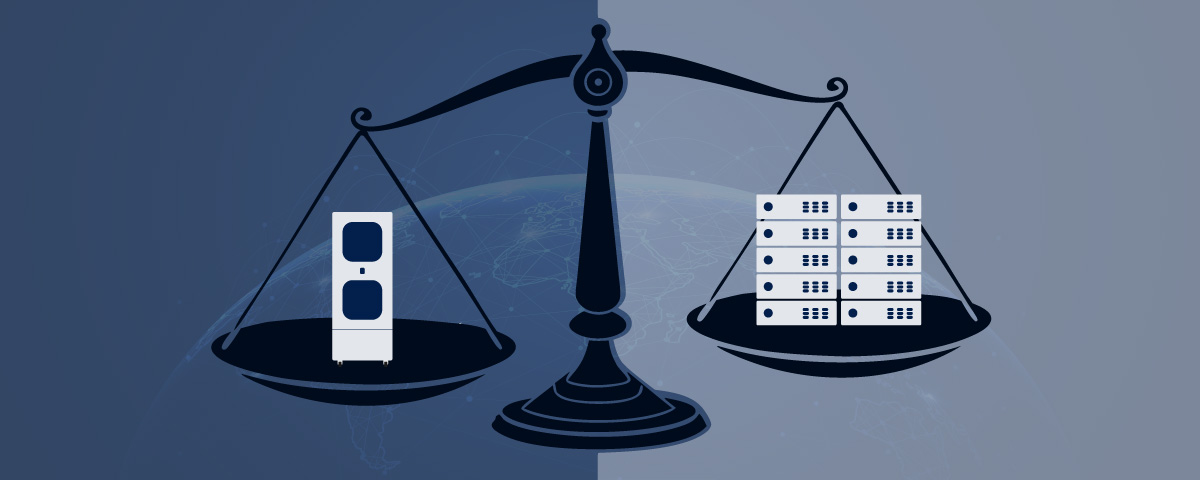Micro data centres are revolutionising IT infrastructure across industries, offering compact, efficient, and scalable solutions for modern computing demands. Get ready to uncover what makes these innovative solutions so unique.
General questions
1. What is a micro data centre?
Micro data centres are compact, self-contained units designed to deliver the core functions of a traditional data centre but in a smaller, more manageable package. Micro data centres, also known as MDCs, are engineered to provide computing power, storage, and networking capabilities at or near the location where data is being generated, which is often referred to as “the edge” of the network.
2. How does a micro data centre differ from a traditional data centre?
Unlike traditional data centres, micro data centres are smaller, more portable, and quicker to deploy. They are ideal for edge computing, offering reduced latency and localised processing power without requiring a large physical footprint.
3. What industries benefit the most from micro data centres?
Industries such as healthcare, education, manufacturing, telecommunications, and mining benefit greatly from micro data centres due to their scalability, efficiency, and ability to support edge computing.
4. Are micro data centres suitable for small businesses?
Yes, micro data centres are perfect for small businesses that need robust IT infrastructure without the high costs and space requirements of traditional data centres. Micro data centres can benefits businesses of all sizes.
5. How do micro data centres support digital transformation initiatives?
By enabling edge computing, micro data centres provide real-time data processing and storage, which supports IoT, AI, and other transformative technologies crucial for digital transformation.
6. What types of organisations typically use micro data centres?
Organisations ranging from startups to large enterprises use micro data centres for edge deployments, remote site operations, and as cost-effective alternatives to traditional data centres.
7. Are micro data centres a good choice for startups?
Yes, they are an excellent choice for startups due to their affordability, scalability, and ability to support fast-growing IT needs.
Technical and operational questions
8. What are the power requirements for a micro data centre?
Micro data centres require a reliable power source and can integrate with backup systems such as batteries or generators. They are designed to optimise energy consumption for efficiency. DC powered micro data centres can also easily be connected to alternative power sources like solar or wind power. Download the Zella Pro technical specifications to find out more.
9. How is cooling handled in a micro data centre?
Integrated precision cooling systems ensure optimal temperature and humidity levels, protecting IT equipment from overheating and ensuring consistent performance.
10. What is the capacity of a micro data centre in terms of servers or IT equipment?
Capacities vary, but micro data centres can typically house several servers, network switches, and storage devices, depending on the model and configuration. Download the Zella Pro technical specifications to find out more.
11. Can micro data centres support high-performance computing or AI workloads?
Yes, many micro data centres are designed to handle demanding workloads, including AI and high-performance computing, by offering robust processing power and low-latency performance.
12. How is redundancy ensured in a micro data centre?
Redundancy is achieved through features such as backup power, failover systems, and redundant cooling to ensure continuous operation even in case of component failures.
13. How are micro data centres monitored and managed?
Most micro data centres come with remote monitoring and management tools, allowing administrators to oversee performance, security, and maintenance from anywhere. Find out more about Zella Sense advanced intelligence and automation system.
14. What is the typical lifespan of a micro data centre?
With proper maintenance, a micro data centre can last over 10 years, making it a durable and long-term solution.
Installation and deployment questions
15. How easy is it to deploy a micro data centre?
Micro data centres are designed for quick deployment. Many models are pre-configured and ready to use within hours of installation.
16. Can micro data centres be installed outdoors or in rugged environments?
Yes, certain models, like the Zella Outback, are built for outdoor and rugged environments, with features such as weatherproofing and enhanced insulation.
17. How much space does a micro data centre require?
Micro data centres have a small footprint, often requiring just a few square metres, making them ideal for space-constrained environments.
18. Are micro data centres portable or easy to relocate?
Yes, micro data centres are portable and can be relocated with minimal effort, allowing flexibility for changing business needs. The Zella Swift is the ultimate in portability.
19. What preparation is required before installing a micro data centre?
Basic site preparation includes ensuring a stable power source, ensuring the micro data centre will fit through all doorways, and finding the right location for the condenser.
20. Can micro data centres be customised for specific deployment scenarios?
Yes, many vendors offer customisation options to meet specific business requirements, including redundant power or cooling features.
21. How long does it take to set up and commission a micro data centre?
Set-up times are typically short, ranging from a few hours to a couple of days, depending on the complexity of the deployment.
Security and compliance questions
22. What security features do micro data centres have?
Micro data centres come with advanced cyber security features (i.e. data encryption) and robust physical security features (i.e. mag locks). Find out more about Zella DC’s security features.
23. Are micro data centres compliant with industry standards?
Yes, most micro data centres are designed to meet compliance standards, ensuring data privacy and security. Find out more about Zella DC’s PCI compliance features.
24. How are physical and cyber threats mitigated in micro data centres?
Physical threats are mitigated through secure enclosures and access controls, while cyber threats are addressed with firewalls, encryption, and continuous monitoring. Find out more about Zella DC’s security features.
25. Do micro data centres offer fire protection?
Yes, many models feature integrated fire protection. Find out more about how to protect your data and assets from fire damage.
26. How do micro data centres protect sensitive data during outages or attacks?
Redundant power systems, secure data backups, and intelligent monitoring systems and automations ensure minimal disruption and protect sensitive information.
27. Are micro data centres resistant to environmental hazards?
Yes, many micro data centres are resistant to environmental hazards such as water and dust. Zella DC’s micro data centres are IP65 rated.
Cost-related questions
28. How much does a micro data centre cost compared to traditional solutions?
Micro data centres are generally more cost-effective, with lower upfront and operational costs compared to traditional data centres. Get in touch with our team to get a quote.
29. What are the maintenance costs for a micro data centre?
Maintenance costs are low due to integrated systems and streamlined design, often requiring minimal regular upkeep. The Zella Pro features a unique design that enables effortless maintenance, allowing non-specialist team members to handle it without incurring ongoing maintenance fees. Thanks to its virtually maintenance-free nature, third-party maintenance inspections are unnecessary.
30. Can micro data centres help reduce IT operational expenses?
Yes, by offering efficient energy use, reduced downtime, precision cooling, and compact designs, micro data centres significantly lower operational expenses. Find out how micro data centres can reduce your costs.
31. Are micro data centres more cost-effective than traditional server rooms?
Absolutely. They integrate power, cooling, and security in one unit, reducing the need for separate systems and associated costs. Find out more about the benefits of micro data centres vs server rooms.
32. What is the ROI for investing in micro data centres?
The ROI is high due to reduced downtime, lower operational costs, and improved efficiency, often recovering initial investment within a few years. Find out why investing in a micro data centres makes financial sense.
33. Are there financing options available for micro data centres?
Yes, many vendors offer flexible financing options, including leasing and payment plans. At Zella DC we offer MDCaaS, Micro Data Centre as a Service; this solution makes it easy for customers to run their own micro data centre on-site with a convenient monthly subscription.
Scalability and flexibility questions
34. Can a micro data centre be easily scaled up or down?
Yes, they are modular and can be scaled to meet changing business needs without significant infrastructure changes.
35. Is it possible to integrate micro data centres with existing IT infrastructure?
Yes, micro data centres are designed to seamlessly integrate with existing IT setups, including cloud and on-premises systems.
36. Can micro data centres be used in hybrid or multi-cloud environments?
Yes, they support hybrid and multi-cloud environments, offering flexibility and localised data processing.
37. Are micro data centres suitable for evolving IT needs?
Absolutely. Their scalability and adaptability make them ideal for businesses with dynamic IT requirements.
Use case and application questions
38. What are common applications for micro data centres?
Micro data centres are widely used in edge computing, IoT, telecommunications, and remote site operations where low latency and local processing are crucial.
39. Can micro data centres support remote or underserved locations?
Yes, they are ideal for remote and underserved locations due to their portability and self-contained design. Find out why micro data centres are perfect for remote or challenging locations.
40. Are they suitable for disaster recovery or backup purposes?
Yes, micro data centres provide reliable disaster recovery and backup solutions, ensuring business continuity.
41. How do micro data centres support IoT and real-time analytics?
By processing data closer to the source, they enable real-time analytics and efficient IoT operations.
42. Can a micro data centre replace a server room?
Yes, micro data centres can replace server rooms by offering the same functionality in a smaller, more efficient package, reducing costs and space requirements.
Environmental and sustainability questions
43. Are micro data centres energy-efficient?
Yes, they are designed for energy efficiency, using precision cooling and optimised power management systems.
44. How do micro data centres contribute to sustainability goals?
By reducing energy consumption and offering renewable energy integration, they help organisations achieve sustainability targets. All our products are designed with energy efficiency in mind. They use advanced cooling and power management technologies to minimise energy consumption and reduce the carbon footprint of data processing. Find out more about the sustainable advantage of micro data centres.
45. Can renewable energy sources power micro data centres?
Yes, many micro data centres can be powered by renewable energy sources such as solar or wind. Learn more about the benefits of DC powered micro data centres.
46. How do micro data centres help businesses lower their carbon footprint?
Their energy efficiency and compact design minimise environmental impact, reducing the overall carbon footprint of IT operations. Find out more about the sustainable advantage of micro data centres.
A few more miscellaneous questions
47. What support and services are provided after deployment?
Most vendors offer ongoing support, including maintenance, upgrades, support, and remote monitoring services.
48. Are there customisation options for micro data centres?
Yes, micro data centres can be tailored to meet specific business needs. With Zella DC you have power options, cooling options, fire protection options, and more.
49. How do micro data centres adapt to future technology trends?
Their modular design and compatibility with emerging technologies like 5G and AI ensure they remain relevant as technology evolves. Find out how micro data centres will help you future-proof your business.
50. Are micro data centres compatible with 5G networks and edge computing?
Yes, micro data centres are designed to support 5G and edge computing, offering low-latency processing for real-time applications. Find out more about the relationship between 5G and micro data centres.
Any other burning questions about micro data centres? Explore our website or get in touch to talk to one of our specialists!





